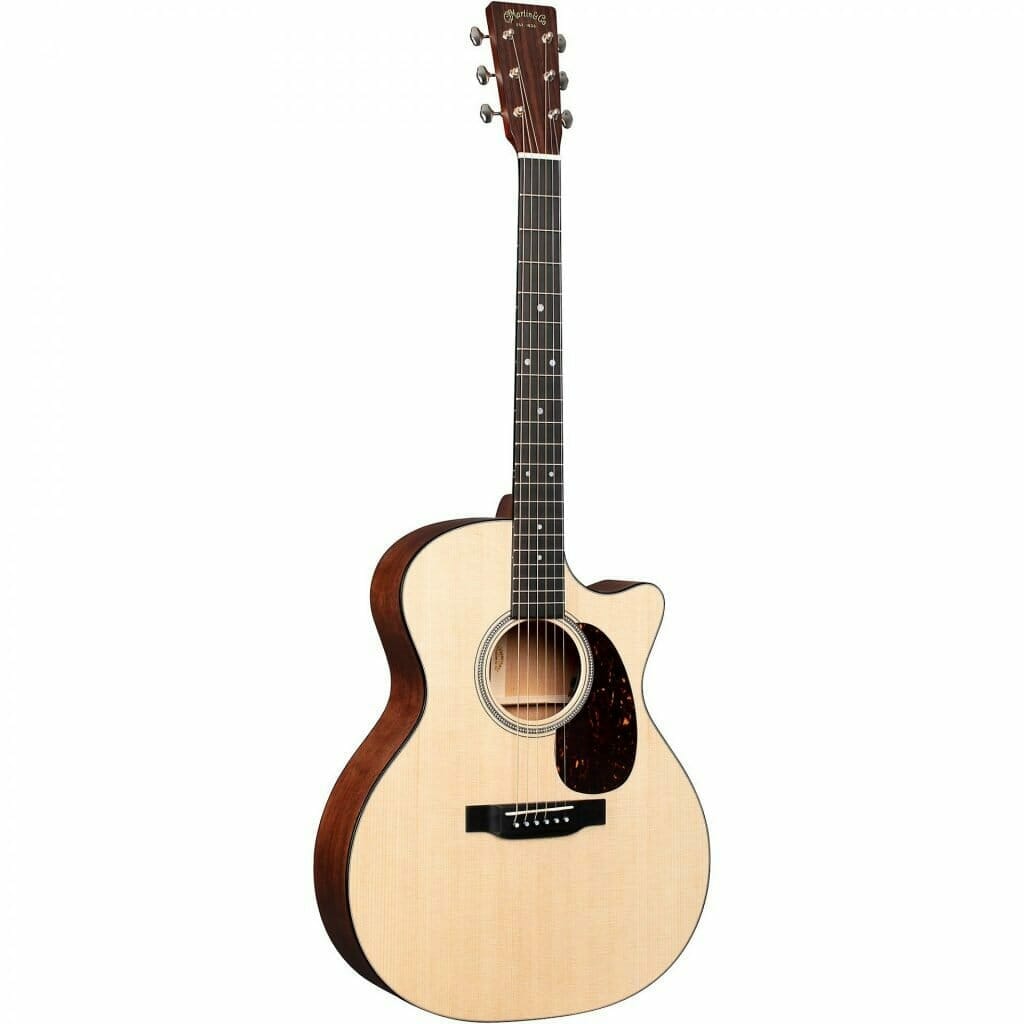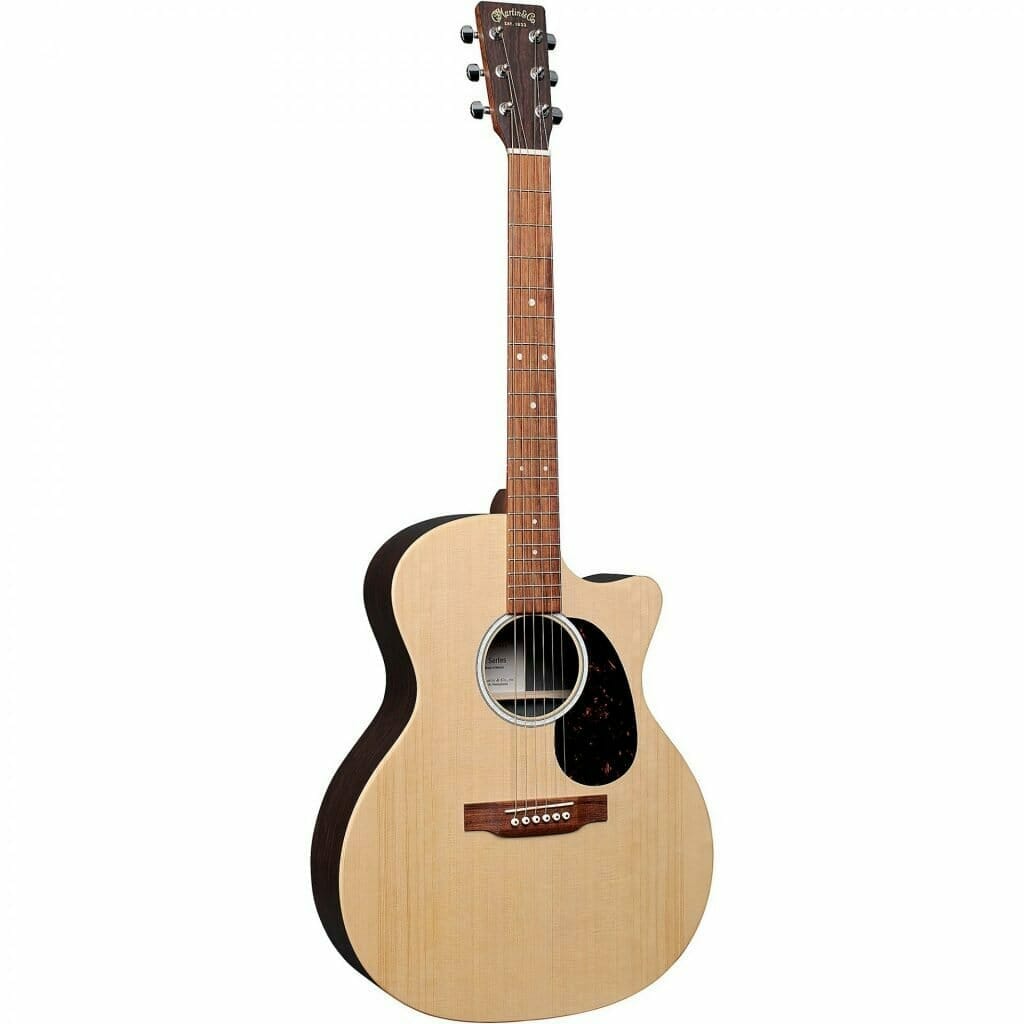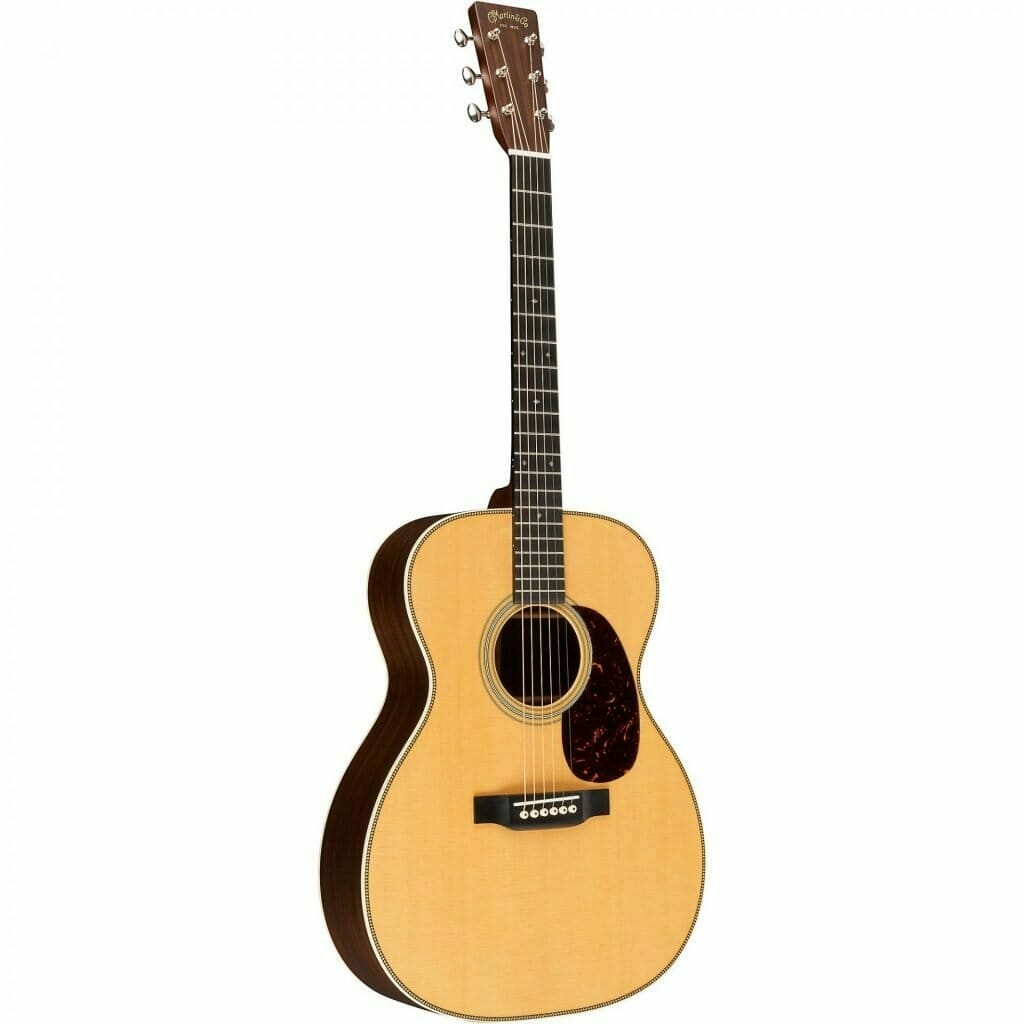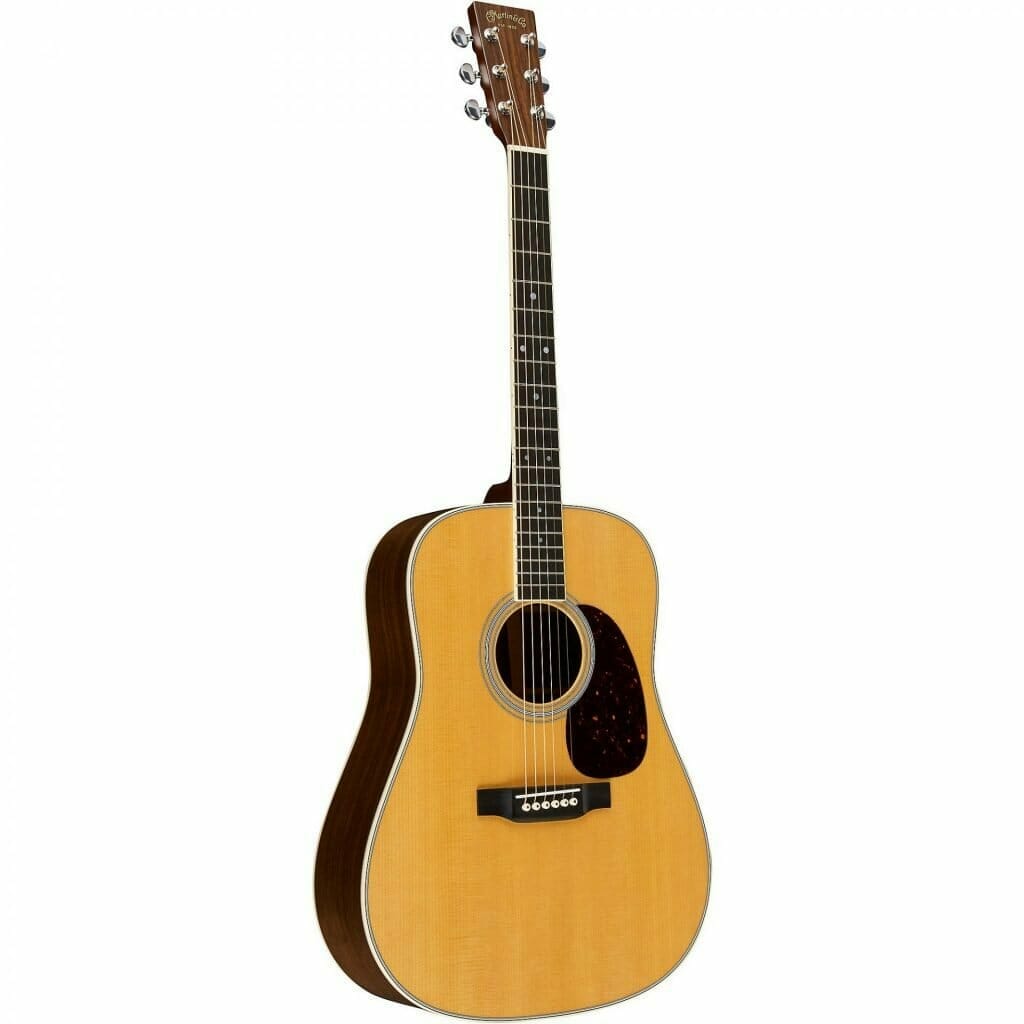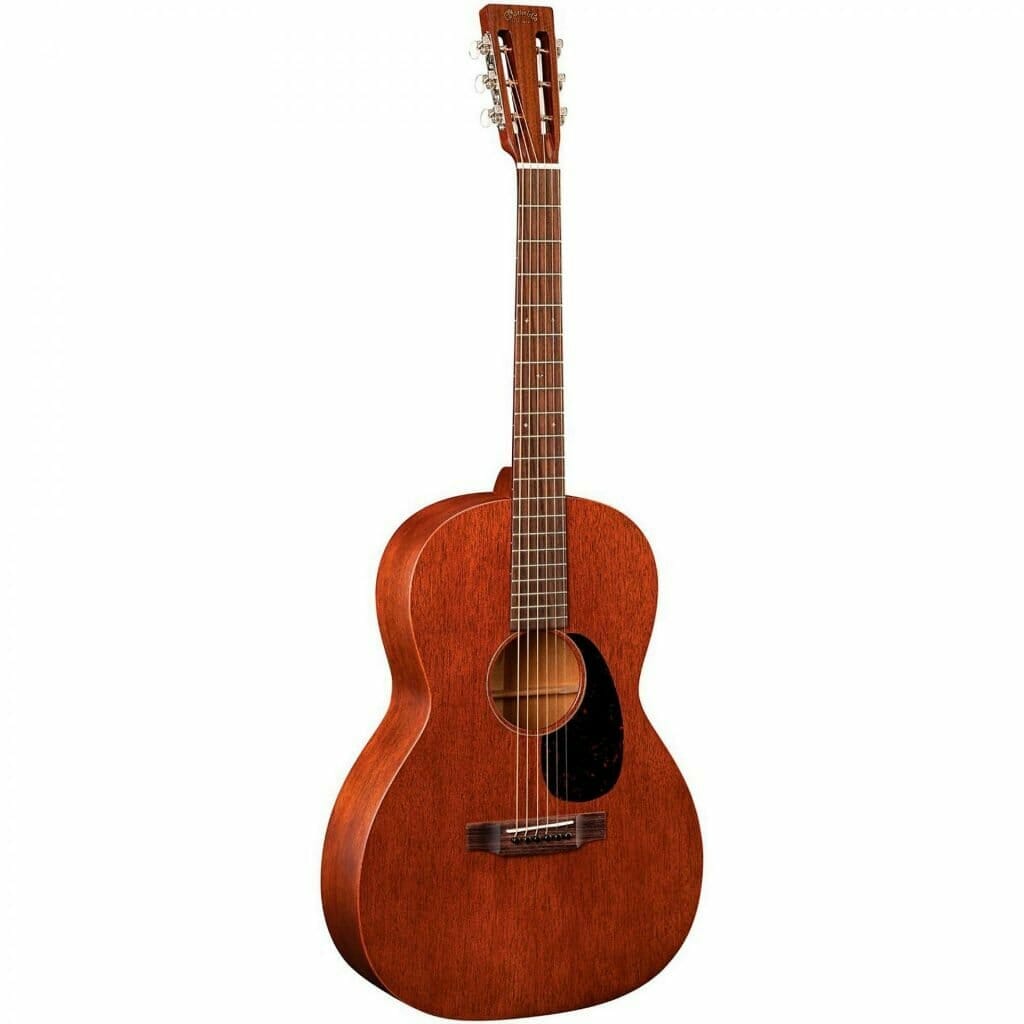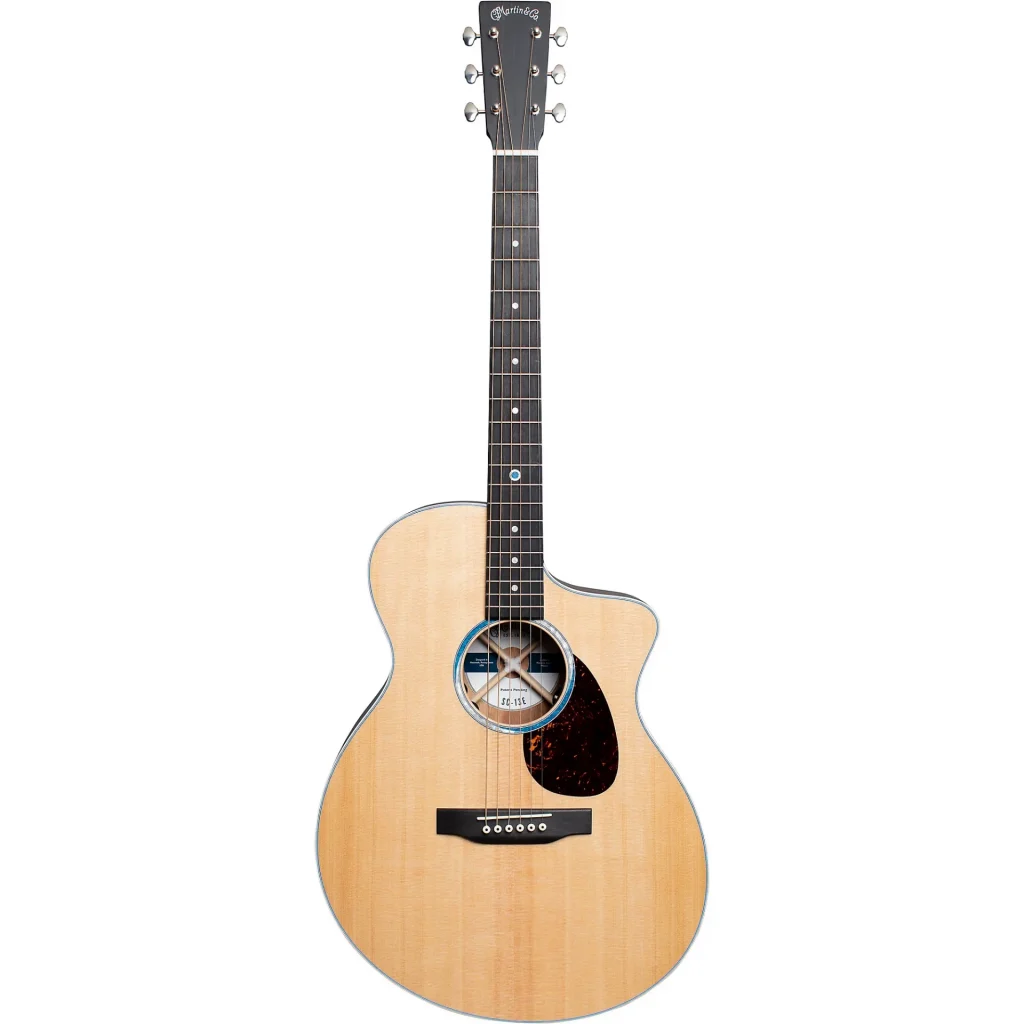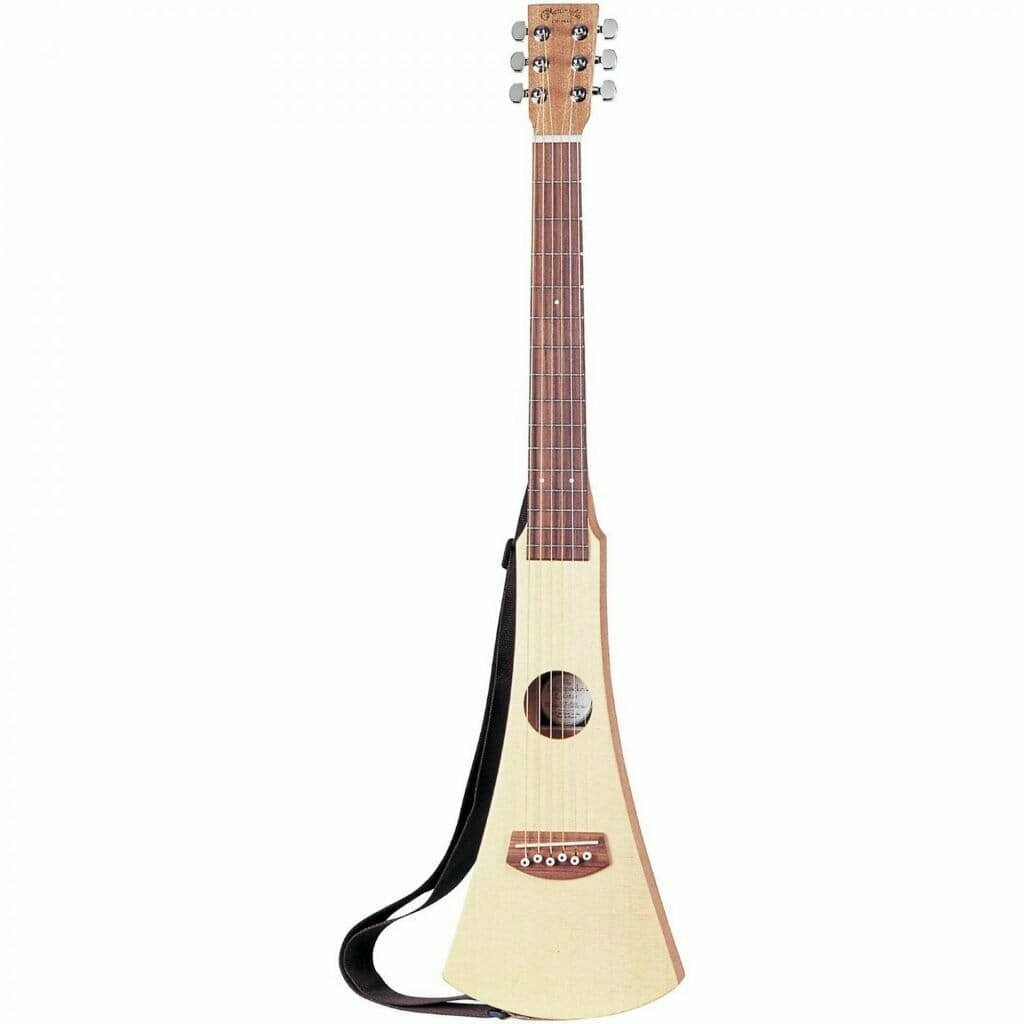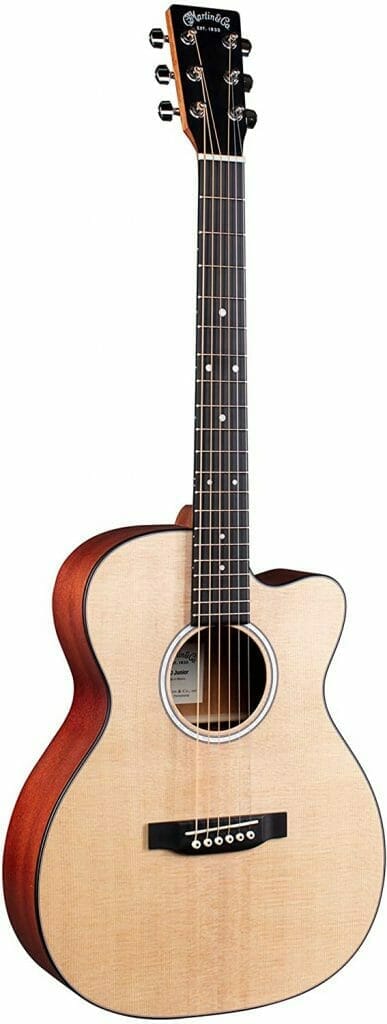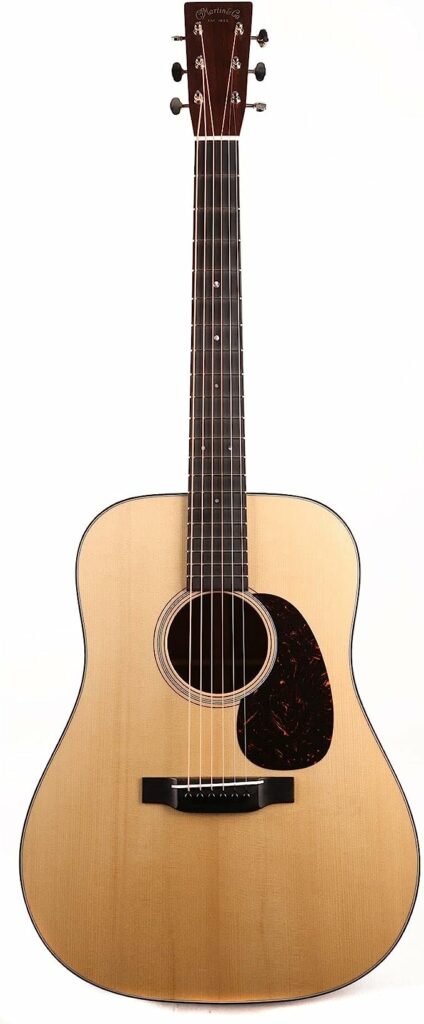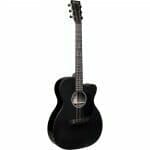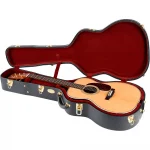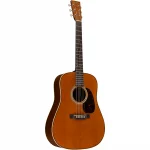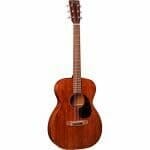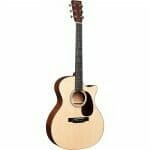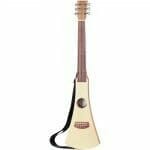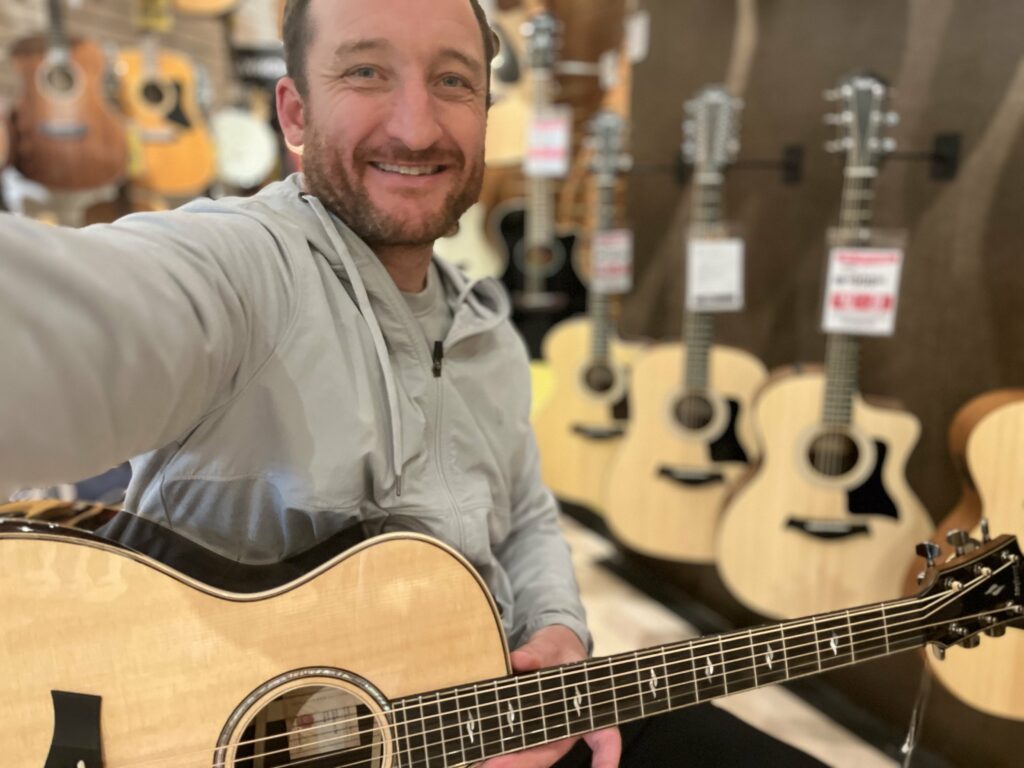In the world of acoustic guitars, a few brands stand out from the crowd for their quality and tone. Martin Guitars is one such brand. But the question remains, “What are the best Martin acoustic guitars for my particular needs?”
Well, this article is your definitive guide to answering this question.
I’ve used my 25+ years of guitar playing experience, countless trips to the local guitar shop, and hours researching to help you cut through the noise and find the best Martin acoustic guitar for you.
If you’re looking for a musical instrument with rich tones, a long history of excellence, and vintage looks, Martin acoustic guitars offer just what you want.
Sit back, grab your favorite drink, and let’s begin!
The Short Answer
The best Martin acoustic guitar is the GPC-16 because of its price, construction, tone, and versatility (read full review here).
However, suppose you want to upgrade your beginner acoustic guitar but don’t want to break the bank. In that case, you should check out the X-Series of acoustic guitars.
-Brad Johnson (Founder/Writer of Song Production Pros)
If you find yourself on the other end of the spectrum, wanting a classic Martin heirloom piece that encompasses everything we love about the brand, then look no further than the Martin Authentic 1937.
Table of Contents
Best Overall: Martin GPC-16e
- Topwood: Solid Sitka Spruce
- Body Wood: Mahogany or Rosewood
- Body Type: Grand Performance Cutaway
- Neck Wood/Radius: Select Hardwood/16''
- Fingerboard: Ebony
- Frets: 20
- Scale Length: 25.4''
- Nut Width: 1.75''
- Case: Softshell Case
Sound quality, design, playability, and versatility come together in the Martin GPC-16E acoustic-electric guitar.
This Grand Auditorium delivers a well-balanced sound with plenty of projection. The smooth, deep cutaway is perfect for finger-picking or flat-picking. At the same time, the onboard Fishman Matrix VT Enhance NT2 pickup system amplifies your sound beautifully.
If you're looking for an acoustic-electric that can do it all, the GPC-16E is an excellent guitar.
- High-quality Martin for a great price
- Great for fingerpicking, flatpicking, and strumming
- Classic tonewood combinations that give you instantly recognizable tones
- It's the only guitar you'll need for any occasion
- The GPC shape doesn't have that classic Martin look
- For the price, you'd expect a hardshell case
Full Review:
The GPC body style doesn’t have the classic Martin dreadnought acoustic guitar vibe. However, there is a solid case to be made that the “Taylor Guitars Shape” is superior for modern players who want versatility in their instrument.
This is why I put the GPC-16e lineup of acoustic guitars as the best Martin acoustic guitars overall. These guitars are highly versatile, comfortable, maintain that classic Martin tone, and have the build quality of Martin’s high-end acoustic guitars.
Thanks to its comfortable taper neck design and cutaway shape, you can play this guitar for long periods. This is crucial for keeping the guitar in your hand and helping you improve while practicing multiple playing styles and scales or maintaining your stamina at your next live gig.
Read the Rest of the Review…
In my Martin GPC-16E review, I noticed how well it quickly adapts to fingerstyle, Flatpicking, and strumming. It feels like your creativity is never hindered or held back by the instrument.
The cutaway design makes it easy to play in the upper registers, and the Ebony fingerboard has a glassier feel than rosewood, often found on Martin acoustic guitars.
This sleek, stylish guitar has outstanding playing dynamics, sound, and projection thanks to the solid Sitka spruce top paired against either mahogany or rosewood back & sides. These classic tonewood combinations create either an articulate and woody tone (Mahogany) or a swirly, thick, blooming overtone (rosewood). Which you prefer is up to your ear 😉
The Martin GPC-16E also are excellent guitar for players who wants to take their studio sound to the stage. It comes equipped with Fishman® Matrix VT Enhance NT2 electronics so you can plugin and bring that classic Martin tone to life through an amp or PA system while gigging out.
While this is a fantastic guitar, I have one massive complaint…it comes with a softshell case. Any all-solid wood acoustic guitar that is shy of $2,000 should come with a hardshell case. Come on, Martin!
However, with that one gripe aside :), If you’re looking for the best Martin guitar that is forward-thinking and can do it all, then the GPC-16E is the “swiss-army knife” guitar you’ve been searching for!
Best Value for Money: Martin X-Series
- Topwood: Solid Spruce or HPL
- Body Wood: HPL
- Body Type: GPC, Dreadnought, 000, 0, OMC
- Case: Gig Bag
Looking for the "best bang for your buck" when purchasing a Martin Guitar? Then the X-Series is the choice for you.
The X-Series are well-constructed guitars that come in all the famous Martin Shapes. From the Dreadnought, 000, GPC, and even a 0; there is a guitar in this series will fit you perfectly. The HPL construction also provides extra durability and protection against weather, so you can rest assured that your guitar will play well even if you take it on the road or live in a humid area.
- Modern neck design makes it simple to play for beginning guitarists
- Choose between all the famous Martin body styles
- Get a Martin at a great price
- Has all the features of a much more expensive guitar
- Laminated wood construction flattens the tone a bit
- Built-in Fishman pickup has limited controls
Full Review:
The X-Series are the best Martin guitar for players who want to invest in a quality acoustic but want to spend less than $1,000.
The X-series gives you that classic Martin tone while being an affordable step up for intermediate guitar players. It also is a fantastic option for experienced players who want an acoustic guitar to take with them for travel or camping trips, as the HPL construction is more durable and resistant to weather fluctuations/humidity.
The X-Series features all of the best Martin acoustic guitar body styles (and even a 12-string guitar), so there is an option depending on your needs and use cases.
- Want a fantastic fingerstyle guitar: OX1 and 00X2
- Need the power and fury of a dreadnought: D-X
- How about the modern playability like our “best overall” option: GPC-X
The thing that I like about the X-series is that Martin has thought of other small design features to make these fantastic instruments easy to play.
Read the Rest of the Review…
The X-Series has a modern neck design that tapers as you move to the upper registers. This makes it comfortable whether you play cowboy chords, noodling jazz licks, or the Pentatonics scale.
The X-Series guitars also come with Fishman MX electronics (designated with an “E”) and a gig bag for the singer/songwriters and performers.
While there are many great things to say about the X-Series, it isn’t without pitfalls. First, solid-wood guitars will sound better than laminate construction. And while some guitars in the X-series lineup feature solid-wood tops, some don’t. So be thoughtful of your needs and what you buying.
However, with that said, The X-Series should be at the top of your list if you’re looking for the best “value for money” Martin acoustic guitars.
Best for Fingerstyle: Martin 000-28
- Topwood: Solid Sitka Spruce
- Body Wood: Solid Rosewood
- Neck Wood/Radius: Select Hardwood/16''
- Neck Shape: Modified Low Oval, High-Performance Taper
- Fingerboard: Ebony
- Frets: 20
- Scale Length: 24.9''
- Nut Width: 1.75''
- Case: Hardshell Case
- Lefty Version Available
If you're searching for the perfect Martin acoustic guitar for fingerstyle playing, look no further than the Martin 000-28.
The 000-28 has a petite body and tapered waist that produces a lively tone emphasizing every note. The solid spruce and rosewood back and sides create a rich sound with overtones and dynamics that remind you of your favorite records. Plus, it's super comfortable to play with and has a lower string tension, making it perfect for fingerstylists.
- It makes playing and conveying complex emotion simple
- Produces a full, focused, and lively tone
- Has "slinky" playability that fingerstyle players love
- Most models don't come with built-in electronics
- It's expensive
Full Review:
Now we are getting into some classic Martin acoustic guitars!
The Martin 000-28 is the best Martin guitar for fingerstyle playing. The body of this guitar is tiny, and the waist of the instrument is tapered to produce a full, focused, and lively tone that emphasizes each note.
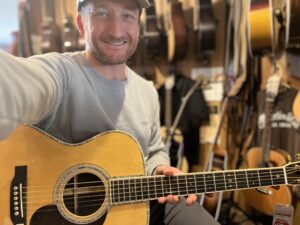
The solid spruce and rosewood back and sides create a lovely sound, rich in overtones and dynamics, which sounds like a familiar record. This guitar also hugs the body intimately and comfortably.
Steel-string guitars with smaller scale lengths, such as the 000-28, produce less string tension, giving them a more “slinky” playability that acoustic fingerstylists enjoy.
If you’re looking for a classic-looking Martin guitar with great dynamics and conveys complex emotion, the 000-28 is worth the money!
Best for Flatpicking & Strumming: D-35
- Topwood: Solid Spruce
- Body Wood: Solid Rosewood
- Neck Wood/Radius: Select Hardwood/16''
- Bracing: Forward Shifted, Non-Scalloped X-Bracing
- Neck Shape: Modified Low Oval, High-Performance Taper
- Fingerboard: Ebony
- Frets: 20
- Scale Length: 25.4''
- Nut Width: 1.75''
- Case: Hardshell Case
The quintessential Martin dreadnought. If you want a guitar that you can lay your pick into and it will keep giving, then look no further.
With a top of select Sitka spruce and East Indian rosewood three-piece back, this guitar delivers a robust bass response and powerful projection ideal for stage and studio.
Of all the best Martin guitars on this list, the D-35 feels amazing and can project across a room.
- This guitar will inspire you to write songs
- The traditional dreadnought has been updated and perfected for today's musicians
- It has a rich, bold tone
- Great for acoustic performances with other instruments
- The dreadnought tone isn't as balanced and nuanced as other guitars on this list
- Doesn't come with electronics
- It's expensive
Full Review:
Martin guitars famously invented the dreadnought shape that has become a favorite of musicians for its rich sound and loud projection, and it wouldn’t be a proper Martin Guitars review without talking about at least one.
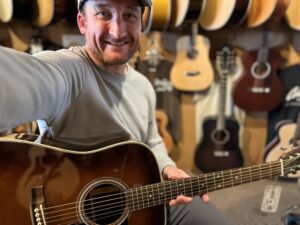
However, Martin has quite a few dreadnought body shapes in their lineup, so what makes the D-35 stand against the rest?
The D-35 is the winner of this category because it incorporates lighter bracing with 1/4″ top, 000 back bracing, and non-scalloped X-bracing, all pushing the dreadnought sound to new levels. This guitar is loud and resonant and is very comfortable to play.
While the dreadnought is built to stand out against loud instruments like banjo and acoustic drums, beware that there aren’t any built-in electronics in the D-35 lineup. So if you want to make this your stage guitar, you will have to install this yourself.
However, if you’re searching for a guitar that will command a room acoustically and become your songwriting companion for years, the D-35 won’t let you down.
Best for Recording: 000-15 Series
- Topwood: Solid Mahogany
- Body Wood: Solid Mahogany
- Neck Wood/Radius: Mahogany/16''
- Bracing: Forward Shifted, Non-Scalloped X-Bracing
- Neck Shape: Modified Low Oval
- Fingerboard: East Indian Rosewood
- Frets: 20
- Scale Length: 25.4''
- Case: Softshell Case
One of the best-selling Martin guitars is also a fantastic instrument for acoustic recordings.
With its all-mahogany construction, this guitar provides incredible warmth and depth of tone that is perfect for singer-songwriters and anyone looking to lay down some serious tracks in their studio.
My favorite is the 15SM, with its 12-fret, small-body design also making it great for casual couch strumming.
- It's a perfect guitar for rootsy recording artists
- Clear, focused, and articulate voicing
- It has a warm tone that sounds like vinyl
- It doesn't come with any built-in electronics
- The woody, vintage tone might be too limiting for some players
Full Review:
When seeking the best Martin acoustic guitar for your next recording session, you will most likely not want a thunderous instrument like a Martin dreadnought.

You should seek a guitar with a clear, focused voice, distinct note separation, and minimal overtones. The 000-15 Series excels in this area. This guitar series features an all-solid mahogany build.
Mahogany also is famous for naturally compressing the guitar’s sound, which aids in keeping your dynamics under control and eliminates the need to “fix it in the mix.”
Read the Rest of the Review…
The 000-15 acoustic guitars are a “back to the basics” style of guitar; however, there are a couple of body shapes to choose from.
- The 000-15 is the famous auditorium body style that provides nice projection but a focused and punchy sound thanks to the pinched waist.
- The 000-15SM is a 12-Fret, pear-shaped parlor guitar that accentuates the mid-range and provides even more organic flavors.
While Both options give you rich tones that sound like a vinyl record, the 000-15SM is my pick for the perfect recording guitar. This guitar has a smooth and “worn in” sound that will add distinctiveness and flair to your recordings.
While the 000-15 is a beautiful instrument, there are things to consider before purchasing. First, some players may find the East Indian Rosewood fingerboard to feel “dry” underneath their fingers. Second, these are costly guitars; for the price, you’d think they’d feature electronics and come with a hardshell case.
If you’re in the market for the best Martin acoustic guitars and want an instrument that will add distinction and flair to your recordings, consider an 000-15
Best for Gigging: Martin SC-13E
- Topwood: Solid Spruce
- Body Wood: Veneer
- Neck Wood/Radius: Select Hardwood/16''
- Bracing: Scalloped X-Bracing
- Neck Shape: Low Profile Velocity
- Fingerboard: Ebony
- Frets: 20
- Scale Length: 25.4''
- Nut Width: 1.75''
- Case: Softshell Case
With its deep cutaway and slim neck, this offset acoustic guitar makes this a fantastic performance instrument.
This guitar is equipped with Fishman MX-T electronics (or L.R. Baggs in the Special) and a built-in tuner, which is perfect for tuning on the fly. While it's not an all-solid wood guitar, the SC-13E is still a fantastic choice for gigging musicians needing a reliable guitar. If you want the best Martin guitar for your next gig, the SC-13E should be at the top of your list!
- The sloped bridge makes it effortless to access the higher frets
- You can play for hours without feeling tired or sore
- The beautiful Martin tone with the playability of an electric guitar
- Ebony bridge has a "glassy" feel
- The off-set body might offend some Martin purists
- Plugged-in tone does suffer a bit from Piezo "quickness" (however, this has been addressed with the Special addition and addition of the L.R. Baggs)
Full Review:
When you’re a gigging musician, you need a comfortable acoustic guitar. One that has excellent electronics and can be easily fixed when weird intonation or fret buzzing issues occur from weather exposure and changes in humidity.
This is where the Martin SC-13E acoustic-electric guitar really shines!
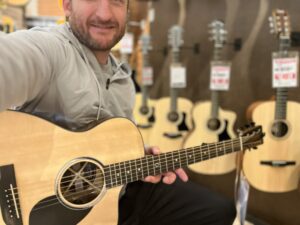
The performance artist in you will love this acoustic-electric guitar’s design. The offset body hugs in close, the neck has the playability of an electric, and the solid Sitka spruce top with X-bracing projects sound across the room.
Another thing that I instantly noticed when playing the SC-13E was the Ebony fingerboard. Ebony has a “glassy” feel, keeping the guitar performance oriented.
Read the Rest of the Review…
It comes equipped with Fishman MX-T electronics (or L.R. Baggs Element if you purchase the Special) and a built-in tuner within the soundhole. To make this guitar even more enticing to the performing artist, you can automatically mute the pickups while you tune your guitar!
While the standard or special is a fantastic acoustic guitar, it isn’t an all-solid wood guitar. So you’re paying for the consistency and durability of playing this guitar on the road. If you’re looking for the most resonant acoustic guitar, consider other options in this price range.
With that said, if you’re looking for the best Martin guitar for your next gig, the SC-13E should be at the top of your list!
Best for Travel: Martin Backpacker
- Topwood: Sapele
- Body Wood: Sapele
- Neck Wood/Radius: Select Hardwood/16''
- Bracing: Backpacker
- Neck Shape: Backpacker
- Fingerboard: Select Hardwood
- Frets: 15
- Scale Length: 24''
- Nut Width: 1.6875''
- Case: Gig Bag
The Martin Steel String Backpacker Guitar is built for traveling. It's small and portable, but it still provides that classic Martin feel.
Plus, it comes with a padded carrying bag for easy transport.
So whether you're on the road or taking a vacation, the Backpacker Guitar is the perfect companion.
- Take the Martin tone with you on a plane, train, or automobile
- Great for traveling, backpacking, and camping
- World-class Martin craftsmanship in a compact package
- The use case of this guitar doesn't extend outside of travel
- Funky body shape takes some time to get used to
Full Review:
Martin guitars have a distinctive sound and are well-liked and appreciated by many music fans. When you’re backpacking or traveling, one of the difficulties of owning a fantastic Martin Guitar is leaving it at home.
Well, Martin has addressed this problem by creating the Steel String Backpacker Guitar that’s ideal for the most tone-obsessed guitar player on the move.
I once traveled across South East Asia for four months with a Martin Backpacker, and it was super easy to take through customs and stowaway.
While this unique body design may turn some buyers off, it still has that undeniable woody Martin tone. It isn’t the thunderous roar of a Martin Dreadnought, but it does the trick when you’re on the go.
Another thing to mention is that you will want to buy a guitar strap. Trying to play this thing sitting down is very awkward.
However, if you identify as a globetrotting nomad, the Steel String Backpacker is the best small Martin guitar for you!
Best for Kids: Martin Jr. Series
- Topwood: Solid Sitka Spruce or Sapele
- Body Wood: Sapele
- Body Shape: Various
- Neck Wood: Select Hardwood Neck
- Fingerboard: Richlite
- Frets: 20
- Electronics: Fishman Sonitone (on select models)
- Case: Gig Bag
While the Martin Junior Series of guitars may not be cheap, they're a high-quality instrument for kids ready to take the next step in their guitar-playing journey.
If your youngster is past the basics and needs a serious performance instrument, investing in one of these Martin Acoustics is a great idea.
- A guitar that will help your child learn to play and sound like a pro
- Same Martin quality in a little guitar
- Also doubles as a fantastic travel guitar
- As your child develops, the neck width might begin to feel small and cramped, especially for fingerstyle
- This guitar is expensive for a kid's instrument
Full Review:
OK, let’s get this out of the way; the Junior Series of guitars is not a cheap guitar for a kid. However, suppose your youngster is past the basics and requires a serious performance instrument. In that case, these Martin Acoustics will be a great investment in their development.
The Junior Series are a 3/4 sized acoustic guitar and feature the most popular body shapes in the Martin acoustic guitars lineup:
- The Dreadnought
- The Auditorium
- The Grand Performance
In 2023, Martin even released an acoustic bass version of the Junior.
Most of the guitar’s in the Junior series feature a solid spruce top. However, if you want a more organic tone, a couple of Mahogany topped guitars are in the lineup. For a small upsell, you can get Fishman Sonitone electronics in your Junior if your little one wants to take their sound to the stage.
If you want one of the best guitars for your youngster, the Martin Junior Series is a great choice!
Check one out today!
Best Premium: D-28 Authentic 1937
- Topwood: Adirondack Spruce
- Body Wood: Guatemalan Rosewood
- Body Shape: Dreadnought
- Bracing: Forward Shifted X-Brace
- Neck Wood/Radius: Mahogany/16''
- Fingerboard: Ebony
- Scale Length: 25.4''
- Nut Width: 1.75''
- Frets: 20
- Case: Hardshell Case
Experience that genuine vintage Martin vibe with the D-28 Authentic 1937.
Made with every detail in mind, including hiding glue and classic building techniques, this instrument has a rich tone steeped in history.
If you're interested in getting your hands on one of these beauties, hurry before they sell out - because once they do, who knows when a guitar like this will come around again?
- You'll be getting a rare, vintage Martin guitar...with a warranty!
- Made from the highest quality materials
- Massive low-end with articulate highs
- This guitar is ridiculously expensive
- Has a very chunky neck that could be uncomfortable for players with smaller hands
Full Review:
Based on an original 1937 D-28 from Martin’s museum, this guitar features many appointments as those found on a vintage 1937 model.
The Vintage Tone System (VTS) ages the woods to a specific period and time. This feature makes the D-28 Authentic 1937 sound similar to a Martin guitar made over 70 years ago.
This instrument has that classic aged look. Just like if you stumbled upon a rare vintage Martin in an estate sale.
If you’re looking for the Rolls Royce of acoustic guitars, then you need to look no further than the D-28 Authentic 1937 Aged Martin.
Buyers Guide for the Best Martin Guitars
Choosing the best Martin Guitar for your playing style and budget can be overwhelming. Martin guitars started manufacturing in 1833 and have centuries of guitars to choose from.
The following buying guide will help you know which will be the best Martin acoustic guitar for you.
Body Styles
There are many different body shapes for guitar, and each has its benefits and drawbacks. Before purchasing a guitar, you must consider your playing style and what type of body will best suit you.
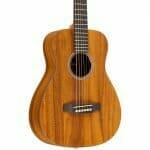
Junior
Martin Guitars’ junior body type sits between a full-scale 000 body type and a travel-sized guitar.
This body type is light and comfortable in your hands. The shortened scale length and reduced dimensions reduce string tension, which makes playing this guitar a pleasure.
This is the ideal guitar for youngsters and adults with smaller hands and frames.
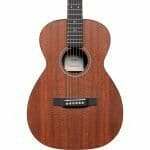
Concert (0)
The Concert body style is not widely used in Martin Guitars’ current product line.
The Concert body style is essentially a parlor guitar with a punchy, focused sound. Because of the more petite frame of this body type, you will sacrifice some low-end heft.
This vintage-style body has a shabby-in, woody vibe. This makes it great for certain recording artists and musicians who want something to play next to a campfire.
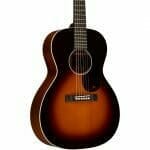
Grand Concert (00)
The Martin Guitars Grand Concert body type is compact and shallow. It rests intimately against your body and is an excellent option for recording artists and guitar players living in small spaces.
The sound of this body type is balanced, articulate, and warm in the low end.
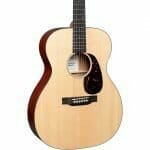
Auditorium (000) & Orchestra (OM)
If you’re a fingerpicker and light strummer, an Auditorium (000) or Orchestra (OM) body style is ideal for you.
These body styles are very responsive and don’t need a heavy touch to get the guitar to sing. These guitar types are also characterized by a well-balanced tone between the strings.
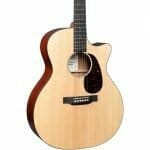
Grand Performance (GP)
The Grand Performance can be played by every player from strummers, fingerstylists, and flat-pickers.
The bass response of this body style is smooth, and it has a well-defined mid-range with a glassy top end. The GP allows you to grow into an expert in any playing style.
The Grand Performance is also pleasant to play. It’s a fantastic choice for anybody looking for a “swiss-army knife” acoustic guitar.
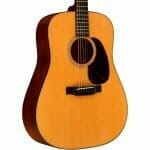
Dreadnought (D)
The dreadnought body shape is history’s most popular and imitated acoustic guitar design. Martin Guitars created it in 1916.
A dreadnought design projects sound across a room. It has a more mid-range forward sound and has been utilized by numerous songwriters such as Neil Young, Bob Dylan, Joni Mitchell, and John Lennon.
If you’re searching for a guitar that can hold its own in a band setting, dreadnoughts are the way to go.
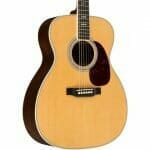
Jumbo (J) & Grand Auditorium 0000 (M)
Martin Guitars’ Jumbo and Grand Auditorium body types resemble a dreadnought guitar but have a more pinched waist.
This design allows for more articulation and separation between notes while maintaining the loud projection of a dreadnought.
These body shapes are ideal for flatpickers and heavy strummers looking to fill a space with their music.
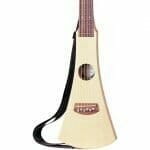
Backpacker
This guitar type is a narrow, light-body style that can easily be carried onto a plane or packed away in your suitcase. If you’re looking to take the timeless Martin Guitar tone with you while hiking some mountains or visiting family, this one is for you.
This body style has a fantastic “woody” sound quality and is ideal for use around a campfire. On the other hand, the disadvantage of this body type is its lack of low end.
Tonewoods
Tonewoods are the materials used to make your instrument and significantly impact the sonic quality your guitar produces. Knowing how different tonewoods influence tone will help you pick the best Martin acoustic guitar for you.
The Soundboard (Top Wood)
The essential tonewood for an acoustic guitar is the soundboard (or top wood). It will most influence your instrument’s projection, playability, and dynamics.
Martins uses various tonewoods on the soundboard, with Sitka spruce and mahogany being the most popular. However, other options are available for guitarists seeking more unusual constructions.

Spruce
Spruce is the most popular top wood for acoustic guitars. Solid spruce is a softwood with a big dynamic range and sonic versatility.
It has excellent dynamic range and quickly responds to lighter picking and strumming while also handling a heavier hand without losing clarity in the notes.
Spruce is a good all-around tonewood that can be used effectively in many genres of music from country, blues, pop, and rock & roll.
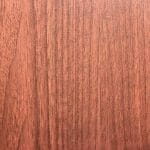
Mahogany
Mahogany is a hard, dark wood with less dynamic range than other top woods. This makes mahogany an excellent choice for recording artists and guitarists with uneven strumming.
Mahogany is a very durable wood that is less prone to cracking and warping like softwood such as cedar does.
Mahogany has a “worn-in” and woody sound, making it a very intimate guitar that is great for blues and folk music.
Sapele
Sapele is a substitute for mahogany for acoustic guitar manufacturers. It is a protected wood, making it a sustainable tonewood option.
It has the same dark hue and tonal qualities as mahogany. The most significant differentiation between the two kinds of wood is that Sapele has a slightly brighter tone. However, most musicians in a blind listening test wouldn’t be able to tell the difference between the two.

Ovangkol
Ovangkol is seldom utilized as a top wood for acoustic guitars, but it is frequently used for the back and sides.
However, Martin Guitars has a few models that use Ovangkol as its top wood. Its sound is well-balanced with plenty of projection.
Curly Mango
Finding a guitar with a Curly Mango top wood isn’t easy. However, it’s used by Martin for a few high-end models in their lineup.
Curly Mango has the same features as Mahogany but has an elegant beauty like Flamed Maple.
Users with a Curly Mango top wood on their Martin guitar claim it has a balanced, mid-range clarity and muted highs.
High-Pressure Laminate (HPL)
Martin Guitars uses paper and resin laminates for some of their X-Series guitars. This laminate makes for a more durable and affordable guitar than a solid wood acoustic.
With laminate woods, you tend to lose some of the richness and depth that you get from a solid wood guitar. So, playing a laminate acoustic guitar first is essential to see if you like the sound.
HPL is less prone to crack and warp when subjected to temperature changes, making it a wise choice for traveling musicians.
Body Wood
Whereas the top wood impacts playability, dynamic range, and projection, the body wood affects the EQ curves of the guitar.
Acoustic guitars produce their unique sounds due to the combination of these woods. In their acoustic collection, Martin Guitars provides a variety of body woods. The most popular will be Rosewood, Mahogony, and Maple.
However, as you’ll notice, Martin provides some alternatives that are worth considering!

Rosewood
Rosewood back and sides is one of acoustic guitar design’s most famous body woods. However, Rosewood is becoming rarer in guitar building because it is over-harvested, while some popular species are even on the endangered list.
Still, Rosewood can be found on higher-end acoustics and has a “scooped” midrange ideal for singer/songwriters. Rosewood produces a sound with plenty of overtones and a smooth high-end that swirls and blooms.
Mahogany
With its unique tone, distinctive feel, warm midrange, and sweet, mellow resonance, Mahogany is one of the most popular woods for guitar body construction.
There’s a natural compression of sound that occurs with mahogany. This makes it an excellent body tonewood choice for recording artists and guitarists who haven’t developed controlled dynamics with their strumming hand.
Curly Mango
Curly Mango is like a more expensive and exotic Mahogany. It has similar sound qualities, although the appearance is more beautiful and similar to flamed maple.
Sapele
Sapele has a similar sound to mahogany back and sides except for having a bit brighter tone. It’s a versatile body wood that will suit many different playing styles.
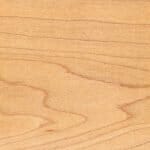
Maple
Maple wood is one of the most beautiful-looking tonewoods. It often is described as having a bright tone. Still, in reality, it’s a very transparent tonewood that has lovely projection.
Maple is excellent for strummers because it has very few overtones. Each note in a chord harmony has clear and focused articulation.

Walnut
Walnut has a bright tone with a slight boost in the low-end. Walnut’s sound will soften as the wood ages but will maintain its clarity.

Koa
Koa is beautiful-looking tonewood from Hawaii and is expensive. It’s often used on premium model guitars and has a bright tone. Like Walnut, Koa’s high-frequency emphasis will mellow out over time.
Grandillo
Granadillo’s tone is similar to Rosewood’s, with wide frequency response, clear note articulation, and sustain. Because Granadillo is denser than Rosewood, the sound has more brilliance in the high end.
Grandillo is a tonewood only found on a couple of Martin Guitar models.
Katalox
Katalox is a very solid and durable tonewood with a lovely purplish hue. Katalox has an excellent projection, long sustain, and clear trebles, similar to the tone of African Blackwood.
It is used most prominently by Martin Guitars for fingerboards and bridges. Still, some of their premium guitars use it for the back and sides.
Ovangkol
Ovangkol is similar to Rosewood but with a little more mid-range presence and a bright high end similar to Koa.
Taylor Acoustic Guitars unveiled Ovangkol to the acoustic community as a more environmentally friendly option to Rosewood. It’s a versatile tonewood that will work for a variety of players.
Mutenye
Mutenye is a not-so-common tonewood that is similar to Ovangkol and Rosewood. It’s used on Martin’s Road Series guitars and has an even, balanced tone.
Mutenye is a beautiful tonewood with thick dark grains.
Siris
Another alternative tonewood utilized by Martin Guitars. Siris has a balanced tone that shares similarities to Koa. However, unlike Koa, Siris tonewood isn’t as expensive and is found on mid-range Martin acoustic guitars.
Myrtle
Another alternative tonewood, Myrtle, is a dense tonewood that doesn’t crack easily. It shares the tonal characteristics of maple with the look of Koa, with very clear and great projection.
It isn’t widely used as a body wood by Martin and is often found on custom shop guitars.
Sustainable Cherry
The Cherry wood that Martin uses is Forest Stewardship Council certified. This means that the wood is sustainably harvested and supports responsible forest management.
Sustainable Cherry has a tone similar to Maple but a bit more mid-range presence and sustain.
Laminates (HPL)
For lower-cost guitars, Martin uses High-Pressure Laminate. When subjected to temperature fluctuations, HPL is less prone to fracture and bend, making it an excellent choice for musicians on the go.
With a laminate construction, you lose some of the richness and depth that solid wood guitars provide. Playing a laminate acoustic guitar before buying one is critical to ensure you are happy with the sound.
The Martin Guitar Series at a Glance
Martin has done an excellent job from being a premium-only brand to extending into some more beginner-friendly price ranges.
You’ll be able to find that classic Martin tone in all of the series; it’s just a matter of understanding which series will inspire you to create your next hit!
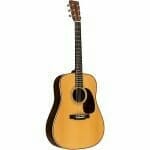
Standard Series
Suppose you want a classic Martin guitar that will gracefully mature into a vintage Martin in 40 years. In that case, the Standard Series is the way to go.
Price: $2,500 to $10,000
Key Features: These musical instruments are beautiful and sound incredible. They come with 200+ years of luthier expertise.
X-Series
If you’re looking for a budget-friendly option for getting that Martin tone, then the X-Series is definitely worth looking at. This series of Martin Guitars features all the classic body designs, but features laminate back and sides which helps keep the cost down.
These guitars are durable and sound good, and it’s the series you want to look at for the best Martin under $1000.
Price: $500-$800
Key Features: HPL bodies, Sitka spruce on most models, and a comfortable neck that’s great for beginner guitarists.
Modern Deluxe Series
This is the series for you if you want a classic Martin on steroids. The Modern Deluxe Series features a unique modern design and an authentically aged sound.
Price: $3,400 – $5,000
Key Features: Martin’s Vintage Tone System (VTS) ages the solid Sitka spruce top, giving it a decades-old sound. The asymmetrical neck design accommodates a wide range of contemporary playing techniques.
Junior Series
These guitars provide the classic Martin sound in a compact package. This is the series to get if you’re searching for an ideal camping guitar or sofa guitar.
Price: $500 – $700
Key Features: A small-bodied Sitka spruce or Sapele top and a lovely Martin tone in an easy-to-carry package.
Authentic Series
Looking for a meticulous re-creation of a Martin guitar from a specific era? Well, the Authentic series will let you own a piece of guitar history, although it will cost you!
Price: $4,800 – $52,000
Key Features: Every guitar is a faithful re-creation of the vintage instrument it imitates, including the glue, the torrefaction to age the topwood, and the construction.
15 Series
The 15 series is the all-solid mahogany builds in the Martin family of guitars. These guitars are designed with the songwriter and performer in mind and have a “woody” and warm tone.
Price: $1,300 – $1,600
Key Features: It features a solid mahogany body, Fishman electronics (optional), and a contemporary design.
16 & 17 Series
This series piggy-backs off the 15 series but instead features different tonewoods such as solid Sitka spruce top, ovangkol top, and solid east Indian Rosewood back and sides.
Price: $1,600 – $2,000
Key Features: Designed with the tone-obsessed professional artist in mind. This guitar features contemporary playability, construction, comfort, and pickup technology.
Road Series
The Martin Road Series is built for gigging musicians who want an affordable, solid wood guitar that can withstand some stress from the road.
This range is where you will find the best value Martin guitar.
Price: $800 – $1,500
Key Features: Modern design, low cost, and solid wood construction for the traveling musician.
Little Martin Series
The Little Martin is the perfect guitar for young kids who have already mastered the basics. Parents will appreciate this small Martin guitar since it has a lovely tone and includes a padded gig bag for simple storage.
Price: $350 – $500
Key Features: A small-bodied, Sitka spruce or Sapele top and a lovely Martin tone in an easy-to-carry package.
Backpacker Series
The Martin backpacker’s unique and innovative design is designed for nomads who can’t stay in one place for long.
Price: $280
Key Features: The Martin tone you know and love in a slender solid Sapele constructed guitar that fits into a backpack.
Limited/Special Edition Series
Martin guitar limited editions are works of art. So expensive, you probably want to keep them in a temperature-controlled glass case somewhere and never touch it. Built for collectors? Yes. Built for Players? Probably not.
Price: $12,000 – $120,000 (that’s not a typo!)
Key Features: These features change depending on the theme/collaboration. Check their site for more details.
Certified/Sustainable Series
Built with FSC-certified wood and manufacturing processes. These guitars are built with sustainability in mind and are for the eco-conscious consumer.
Price: $2,000
Key Features: Guitar built with sustainable woods, responsible harvesting practices, and ethical labor.
Signature Editions
Want the same style guitar that John Mayer, Johnny Cash, or Eric Clapton play? Then get one of their signature editions!
Price: $600 – $5,000
Key Features: Artists collaborate and offer input to create player-specific improvements on Martin’s traditional guitars.
Electronics and Pickups
When buying the best Martin guitar for your needs, it’s critical to check if pickups and electronics are included with your purchase.
Some Martin guitars will come with Fishman electronics, but some vintage-style replicas will not.
This isn’t an issue if you aren’t planning to perform live music. However, if you spend most of your time in a recording studio, you will pay extra for the electronics/pickups while never using them.
Before spending your hard-earned money on a Martin Guitar, be a wise buyer and figure out what you will use the guitar for.
Sustainability and Innovation
For almost two centuries, Martin has been producing high-end acoustic guitars. They invented and popularized the standard dreadnought guitar, developed X-Bracing (becoming the golden standard for guitar construction), and designed the 14-Fret neck.
Without a doubt, Martin has revolutionized the acoustic guitar world.
In 1990, Martin began developing environmentally sustainable business procedures that encourage people to utilize alternative wood construction while providing economic, social, and cultural benefits wherever they do business.
This is another example of pushing the envelope with guitar manufacturing to ensure that future guitarists can access excellent guitars.
FAQ
The most common questions surrounding Martin Guitars answered.
What is the most famous Martin guitar?
The most famous Martin guitar is the D-28 dreadnought shape. The dreadnought tone is adored by musicians worldwide because of its excellent projection and rich tone.
Is Martin guitar good for fingerstyle?
Are Martin Guitars worth the money?
Yes. Martin Guitars are worth your money. Martin builds acoustic instruments meant to last, and their tone is world-famous.
Martin also comes with a lifetime limited warranty on all of their guitars.
Does Martin make acoustic-electric guitars?
Yes. Lots of Martin acoustics come with Fishman electronics, so you can plug in and amplify your Martin guitar.
What is the most sought-after Martin guitar?
The Kurt Cobain 1959 D-18E that he played during Nirvana’s “Unplugged” session sold for $6,000,000.
This makes this the most expensive and rare Martin in history.
Are Martin Guitars better than Taylor Guitars?
Only you can answer this one. Both produce high-quality guitars, and it all depends on what you’re looking for in a guitar.
Martin tends to have a more mid-range, woody tone, while Taylor’s often have a brighter, modern tone.
00 vs. 000 | What’s the Difference?
The 00 and 000 body shape is very similar. They both share the same body depth, but the 00s generally have less spacing between the frets because they have a smaller body.
This can make them good guitars for players with slightly smaller hands.
To Recap
When you’re looking for the best Martin Acoustic guitars, consider your use case and budget. There is a model in their lineup that will suit your needs perfectly.
The GPC-16E is a favorite due to its versatility in sound and the quality of construction. However, if you want something more traditional to Martin Guitars, check out the D-35.
Thanks for reading, and I hope you enjoy your new Martin Acoustic Guitar!

